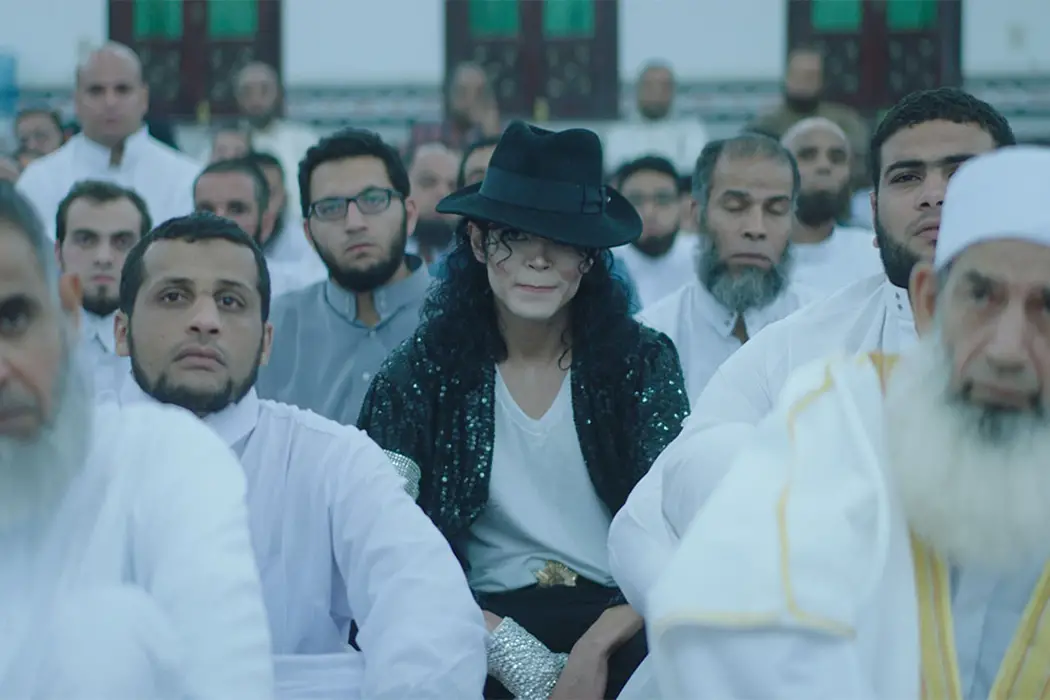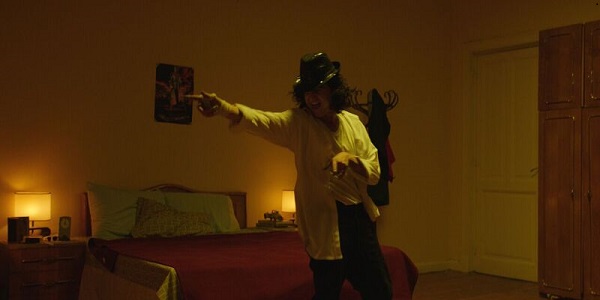SHEIKH JACKSON: Imam In The Mirror

Musanna Ahmed is a freelance film critic writing for Film…
Egyptian filmmaker Amr Salama is fearless in choosing tough topics to tackle in his films. Asmaa was about the taboo subject of AIDS. Excuse My French, a comedy about a Christian kid misunderstood to be Muslim, was censored multiple times before release. Sheikh Jackson follows an Islamic cleric who suffers a crisis of faith after hearing about the death of… Michael Jackson.
HIStory / Ghosts
Egypt’s (unsuccessful) submission for the Foreign Language Academy Award, Sheikh Jackson has an offbeat premise on paper, but Salama uses Michael Jackson as a way of examining one man’s psyche and the popstar’s influence on his coming-of-age. With a therapy session serving as a wraparound, hardline imam Khaled Hany (Ahmed El-Fishawy) tries to recall the last time he cried. It’s been a while, which is unusual for a God-fearing man leading the prayers.
Hearing the news of Michael Jackson’s death, however, unspools a host of suppressed feelings that go as far back as childhood. Intermittently, he’s haunted by the ghost of Michael Jackson (physically present through professional impersonator Carlo Riley) who appears in his dreams and in the congregations at the mosque, the worst time and place for Hany to be triggered.
The young Hany is a curious boy, with a stocky traditionalist father (Maged El Kadwany) who tries to shape his son’s worldview through a conservative lens, old-fashioned gender roles and all. The undefinable appearance of Michael Jackson and his smooth dance moves inspire Hany, despite his father’s derision of Jackson’s masculinity.
When Hany reaches his teenage years, he sports the ’90s era long hair like his hero, buys a similar attire and practises the signature dance moves. These dance scenes are underscored by the most off-putting parts of the score because of their wild dissimilarity to Jackson’s music. Of course, licensing Michael Jackson’s real music would have set the crew back a fortune.

Teenage Hany is interested in a girl (Salma Abu Deif) at school who shares similar interests and stimulates his desire for pursuing a life similar to that of his idol. Abu Deif is a debutante actress who’s known for modelling and has over 500,000 followers on Instagram. She has the potential to be a movie star (and a solid fanbase to help her rapidly ascend to one) but let’s hope she doesn’t get sidelined into more manic pixie dream girl roles like the one in Sheikh Jackson (her character’s name already escapes me hours after seeing the film).
Visually inspired and thematically potent
Despite some of the choice of music, for the most part Salama and his team are very creative with the use of sound, such as in a car repair scene where the clanging sounds converge into the drum arrangement of the popstar’s edgy hit ‘They Don’t Care About Us’. The most famous beats are recreated in the greatest moment of the film – at the height of Sheikh Hany’s emotional tailspin, we delve into his mind in a brilliantly trippy sequence that sees him wander through a fantastical portal of his past life, where he encounters various figures important to him and how they’ve been affected through all of this.
It’s the best of a bunch of visually and sonically creative sequences of the man’s psyche, where the spirit of Michael Jackson looms large. Salama is such a strong visualist, he may well have been able to tell his story with a sparse amount of dialogue, for it’s the near-silent moments that are the most memorable.

Salama tackles the potentially controversial issue by avoiding the black and whiteness of ‘religious versus non-religious’ (even though his character is on one superlative) and instead examining the degrees of faith in a character. The idea he considers instead is bigger yet more nuanced, and that’s the entire spectrum of religiousness and an individual’s odyssey across it when they’re most tested in life. Hypocrisy, morality, and guilt are some of the threads that run through the narrative; yet, at a fleeting 93 minutes, Sheikh Jackson only gets so far in its deeper exploration of them.
Sheikh Jackson: Conclusion
The arresting visuals at their most peculiar would be my biggest reason to recommend seeing Sheikh Jackson, but it’s worth watching because it’s a good coming-of-age story with a nuanced depiction of faith and a strong character arc at the centre. It could have been longer given its rich material, but it leads to a cathartic ending and sidesteps a lot of clichés along the way.
What did you think of Sheikh Jackson? Let us know in the comments below.
Sheikh Jackson is out now in cinemas across the USA and has a pending release date for the UK. For more release info, click here.
Does content like this matter to you?
Become a Member and support film journalism. Unlock access to all of Film Inquiry`s great articles. Join a community of like-minded readers who are passionate about cinema - get access to our private members Network, give back to independent filmmakers, and more.
Musanna Ahmed is a freelance film critic writing for Film Inquiry, The Movie Waffler and The Upcoming. His taste in film knows no boundaries.













